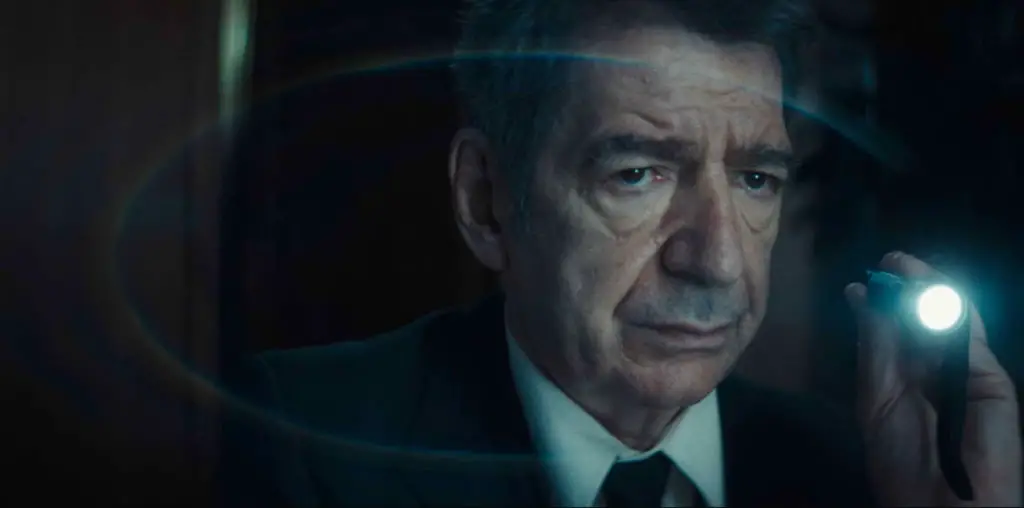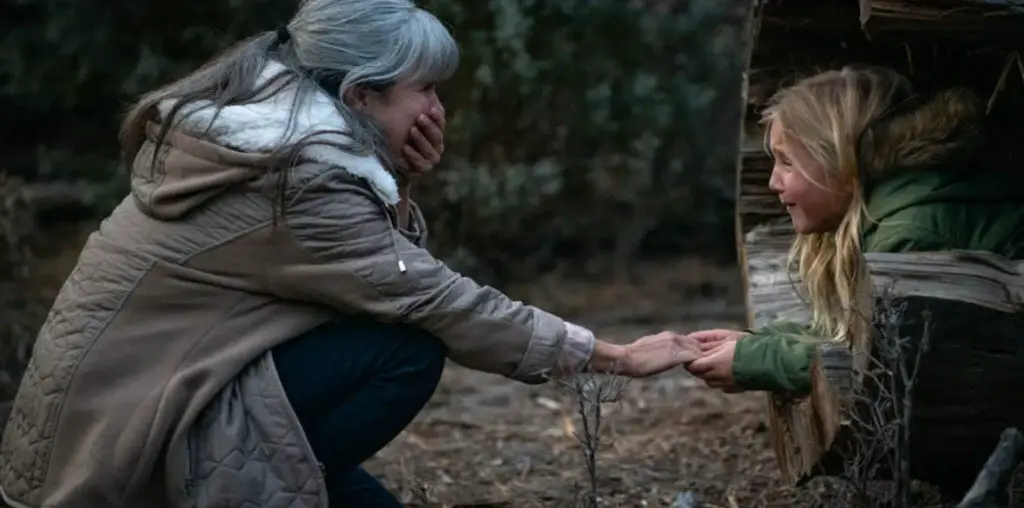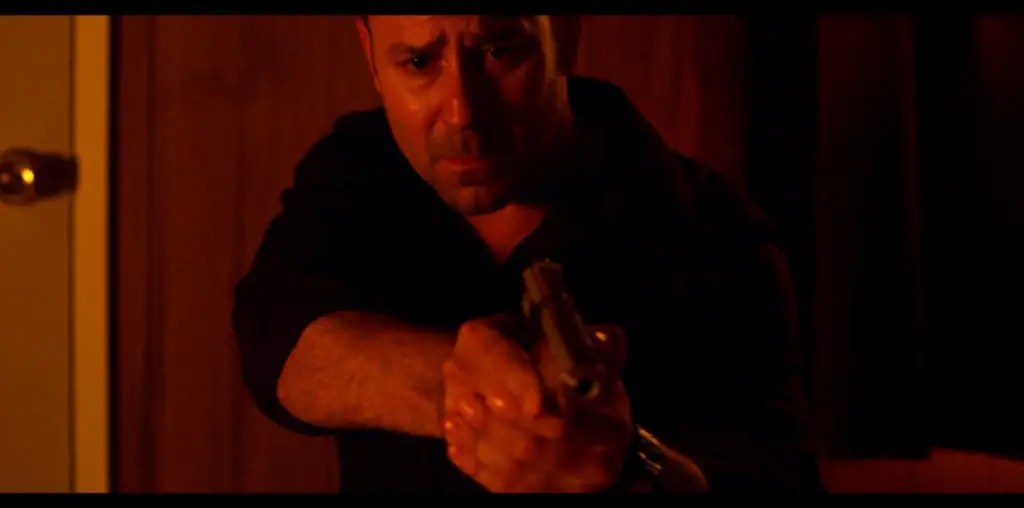
Snow, three friends and loaded guns… recipe for a fun afternoon, or an invitation for disaster? Tub, Kenny and Frank head out into the woods for a snowy day of hunting, only to find out what happens when friendly joking and goading turns cruel and unfortunate. Film Threat’s Mark Bell talks to filmmaker Ben Gray about his 35mm short film “The Hunter,” playing festivals instead of screening online and what it’s like working with Larry Fessenden…
Where did the idea for “The Hunter” come from?
The movie is based on the Tobias Wolff short story “Hunters in the Snow.” I had a teacher in seventh grade who decided the story was appropriate for a room full of eleven year olds, and God bless him for it. It floored me. It planted a seed. I’ve come back to it every year since.
In many ways it’s perfect that I found this story when I did. “The Hunter” is full of all those competing jealousies, the jockeying for position that starts to take place at adolescence.
Tub’s experience is an adolescent experience, he’s still trying to figure out what it means to be a man. And that means learning about aggression, about the role it plays in even our closest, most intimate relationships. That’s the dynamic that drives the story: that the line between intimacy and aggression is really razor-thin.
Why did you choose to shoot the short in 35mm?
We shot the film on 35mm Black and White stock for a number of reasons. I’ve always thought of “The Hunter” as a throwback, a classical story that needed a classical look to it–and Black and White achieves that. And because we were going for a traditional look we decided that the more gritty 16mm black-and-white aesthetic wasn’t going to work for us.
I watched movies like “Dead Man,” “Down By Law”, and “Paper Moon” with our DP Thomas Krivy, and I love the way the Black and White cinematography gives an edge to the more comedic aspects of those films. It challenges you to look past the simple humor in a situation. When you’re looking at a Black and White world, you’re seeing an abstracted version of our own, and you can’t take the landscape or the setting for granted. You have to experience it as a new place, unique to the film you’re watching. You have to learn it. And that’s essential for a movie with as strange and delicate a balance of humor and melancholy as “The Hunter”.
Actually, the decision to shoot on 35mm didn’t affect our budget much, because there is so much B&W 35mm stock just laying around these days. No one shoots it anymore. And so we were able to get a lot of it for free.
How much did it cost you then?
The budget question! I’ve been told never to answer it. So here’s my answer: we squeezed as many favors as possible out of as many people, vendors, institutions as we could find, we worked fast, and were able to bring “The Hunter” in on 35mm for a lot less than many people spend to shoot on 16mm.
What was the basic production timeline? How long did it take to get from idea to final film?
I knew 100% that I wanted to make this movie 3 years ago. It took me a year to get up the nerve to contact Tobias Wolff and ask him for permission. It took him about 17 minutes to email me back and say ok. Apparently he checks email as compulsively as I do.
Probably the longest part of the process was post-production. I took forever to edit the film. But then this is my thesis film (at Columbia), and the last project I’ll probably ever be able to take as long as I want to cut.
The editor, Paul Frank, and I cut the movie separately, scene-by-scene. Initially we would only check in with each other every few weeks to compare cuts and compile what we thought worked. Working alone like that, we were able to follow our ideas through to their conclusions, and found a lot of great stuff as a result. It was wonderful creatively but a very slow process. We locked picture about six months after we started cutting.
So all in all the movie started screening at festivals about a year after we shot it, and two years after I started writing the script.
How did you go about casting? How did Larry Fessenden come to be involved?
I saw David Warshofsky in “Personal Velocity” and wrote Frank for him. David was perfect for the role because he has this extraordinary way of portraying men who are driven by feelings and desires they don’t completely understand.
We worked with two casting directors, Rori Bergman and Julie Schubert, to cast Tub and Kenny. Casting Tub was a real challenge, because the character is so specific, physically and emotionally. Joel Marsh Garland came on only a few days before we started shooting–and I shudder when I think about what might have happened had he not, because I can’t imagine anyone else in that role.
I got in touch with Larry through the casting directors. I sent him the script and told him I wanted him to chain the movie to his back bumper and GO. Which is exactly what he did.
I was nervous at first about working with Larry–you look at Larry’s films and you know how precise and specific he is in his ideas, his choices and his beliefs, and I wasn’t sure how that would translate into our relationship on set. In my disaster fantasy the DP wouldn’t know who to listen to by the end of the first day…And now of course I wish he had spoken up a few times about some of my more boneheaded decisions…
What I didn’t know then is that they call Larry the “Roger Corman of the East Village,” because he has been an enormous help to so many young filmmakers at the start of their careers. Larry was there for every cut of “The Hunter”, giving us feedback into the wee hours, helping us navigate the film through post-production.
And then there’s his performance. Larry dove right into the snow on every take, refused every cheat we had prepared to protect him from the elements, basically dragged himself through the shoot. His performance is so strong, funny, terrifying. You look into Kenny’s eyes and have no idea who’s in the driver’s seat.
What do you think drew the actors to the script?
My best guess is that it’s the same thing that drew me to “Hunters in the Snow”. This story presents a very subtle, unique challenge. It defies the easy cause-and-effect narrative that drives so many films today — and the cast was excited about that challenge.
When I sat down to write the script I had no idea how I was going to make this work. And I think when the four of us sat down at the first reading, there was a similar feeling of trepidation. None of us had any idea what was about to happen. Or if it would work. And that’s very exciting.
The film is in the midst of its festival run. What festivals has your film screened at so far? Any awards?
We’ve been fortunate so far on the festival circuit: some highlights are CineVegas, the Florida Film Festival, and the USA Film Festival, where “The Hunter” won the Grand Prize in the National Short Film and Video Competition, particularly exciting because the win qualifies “The Hunter” for Academy award consideration.
The venue for shorts seems to have shifted to online video sites like YouTube or iFilm. Why play festivals instead of just showing your film online?
The audiences! Q and As! I love hearing people’s reactions to the film, sitting in the back of the theater, pacing, obsessing over framing and sound levels, watching people watch “The Hunter.” You spend so much time sitting inside your cave during the filmmaking process that it’s wonderful to finally come out into the light and share the work with someone.
I’ve gotten several offers to distribute the film online over the past months, and I’m glad I held off on accepting any of them, in order to focus on playing festivals. Because of the win at the USA FIlm Festival “The Hunter” is one of a few dozen films eligible for this year’s Best Live Action Short Oscar nominations — and had we already been online, we would have been disqualified by the Academy.
So online distribution, at least early on, limits a short’s possibilities, I think. Some festivals won’t take it. Some competitions won’t take it. It’s a terrific outlet and a great way to share your work, but nothing beats a real live audience. Even when they hate it.
What’s next for you?
I have two feature scripts in the works right now, and I have a three-minute short that, in an ideal world, I’d be able to shoot in August or September.
Anything you’d like to tell me that I did not ask?
www.myspace.com/thehunterfilm
Ben Gray’s “The Hunter” can currently be seen at the 2007 AFI Film Festival…


